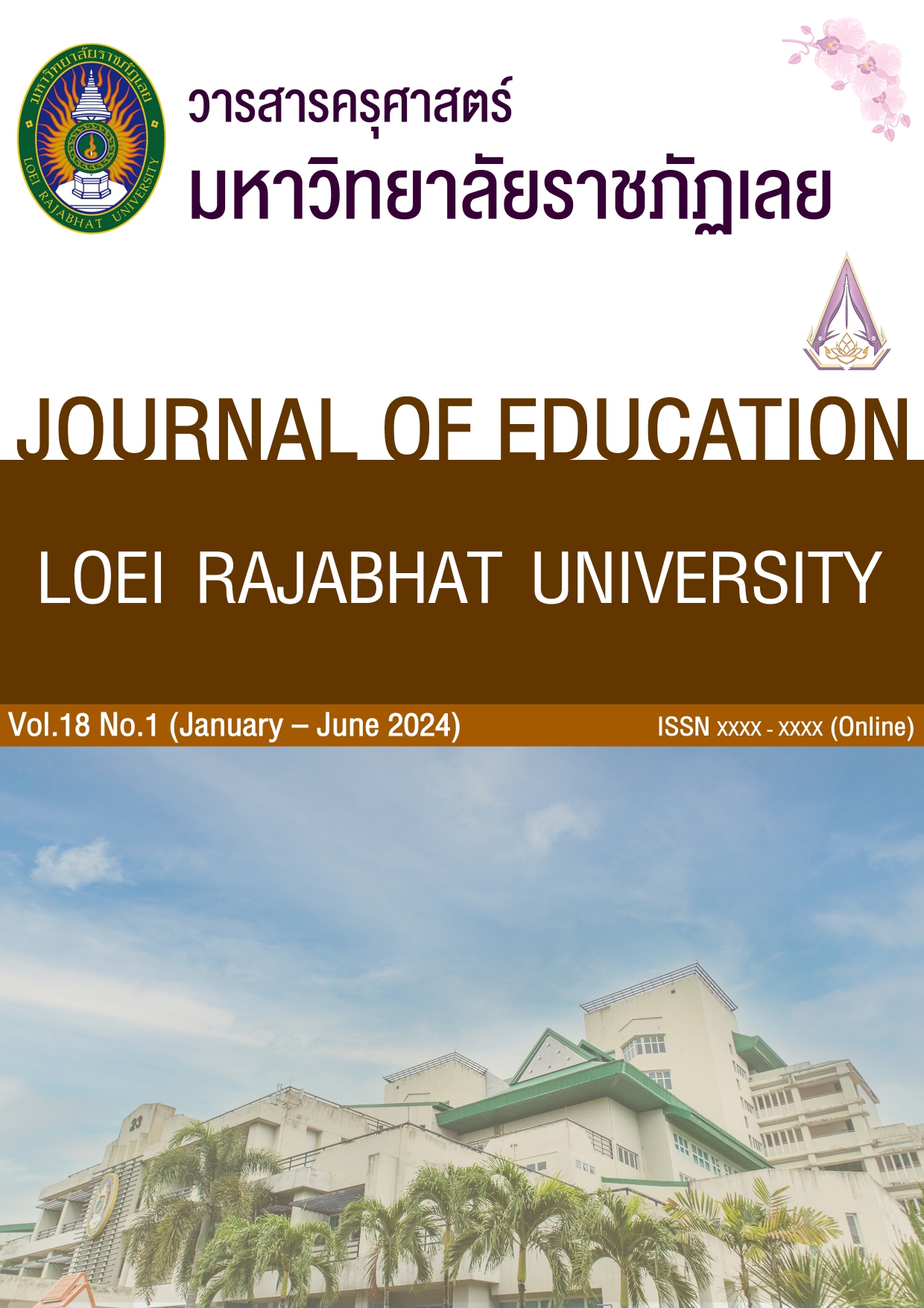The Developing the ability to write reports on qualitative data analysis of student teachers, Loei Rajabhat University Using reflective thinking and active learning management strategies
Keywords:
Management strategies, Reflective thinking, Active learning, Qualitative data analysis report writingAbstract
This research aims to 1) compare the abilities to write report on qualitative data analysis of teacher students before and after learning using reflective thinking and inquiry-based learning strategies, and 2) compare the abilities to write report on qualitative data analysis of teacher students after learning using reflective thinking and inquiry-based learning strategies with a 60% score criterion. The sample used in this study consisted of
27 third-year teacher students from the Faculty of Education. The sampling method was
a method of cluster random sampling. The research instruments included a measurement
of the ability to write qualitative data analysis reports and data analysis, including frequency, percentage, dependent samples t-test and one sample t-test. The research findings indicate that teacher students after learning reflective thinking and inquiry-based learning strategies scored higher in their ability to write reports compared to before learning and exceeded the 60% score criterion with statistical significance at the .05 level.
References
ปวีณภัทร นิธิตันติวัฒน์, (2557). แนวการจัดการเรียนการสอนโดยใช้การสะท้อนคิด (Reflection).
วิทยาลัยพยาบาลบรมราชชนนี ราชบุรี.
ภัทราพร เกษสังข์. (2566). การวิจัยปฏิบัติการ, (พิมพ์ครั้งที่ 2). สำนักพิมพ์จุฬาลงกรณ์มหาวิทยาลัย.
Barrows, H. S., & Tamblyn, R. M. (1980). Problem-based learning: An approach
to medical education. New York, Springer Publishing Company.
Boud, D., Keogh, R., & Walker, D. (2013). Reflection: Turning experience into learning.
Routledge. From https://doi.org/10.4324/9781315059051
Branch Jr, W. T., & Paranjape, A. (2002). Feedback and reflection: teaching methods
for clinical settings. Academic Medicine, 77(12 Part 1), 1185-1188. From
https://doi.org/10.1080/2159676X.2019.1628806
Braun, V., & Clarke, V. (2019). Reflecting on reflexive thematic analysis. Qualitative
research in sport, exercise and health. 11(4), 589-597. From
https://doi.org/10.1080/2159676X.2019.1628806
Freeman, S., Eddy, S. L., McDonough, M., Smith, M. K., Okoroafor, N., Jordt, H., &
Wenderoth, M. P. (2014). Active learning increases student performance in
science, engineering, and mathematics. Proceedings of the National Academy
of Sciences, 111(23), 8410-84201915. From https://doi: 10.1073/pnas.1319030111.
Epub 2014 May 12. PMID: 24821756; PMCID: PMC4060654.
Haak, D. C., HilleRisLambers, J., Pitre, E., & Freeman, S. (2011). Increased structure and
active learning reduce the achievement gap in introductory biology.
Science, 332(6034), 1213-1216. From https://doi: 10.1126/science.1204820. PMID:
Heale, R., & Twycross, A. (2018). What is a case study?. Evidence-based nursing, 21(1),
-8. From http://dx.doi.org/10.1136/eb-2017-102845
Johnson, D. W., Johnson, R. T., & Smith, K. A. (2014). Cooperative learning: Improving
university instruction by basing practice on validated theory. Journal on
Excellence in University Teaching, 25(4), 1-26. From
https://CLImprovingUnInstruction2015copy.pdf
Kirschner, P. A., Sweller, J., & Clark, R. E. (2006). Why minimal guidance during instruction
does not work: An analysis of the failure of constructivist, discovery, problem-
based, experiential, and inquiry-based teaching. Educational Psychologist, 41(2),
-86. From https://doi.org/10.1207/s15326985ep4102_1
Mertler, C. A., & Charles, C. M. (2010). Introduction to educational research (7th ed.). Sage.
Mirzaei, F., Phang, F. A., & Kashefi, H. (2014). Measuring teachers reflective thinking
skills. Procedia-Social and Behavioral Sciences, 141, 640-647. From
https://doi.org/10.1016/j.sbspro.2014.05.112
Prince, M. J. (2004). Does active learning work? A review of the research. Journal of
engineering education, 93(3), 223-231. From
https://doi.org/10.1002/j.2168-9830.2004.tb00809
Prince, M. J., & Felder, R. D. (2007). The many faces of inductive teaching and
learning. Journal of College Science Teaching, 36(5), 14-20. From
https://www/Inductive(JCST).pdf (pfw.edu)
Schön, D. A. (1983). The reflective practitioner: How professionals think in action.
London, Routledge. From https://doi.org/10.4324/9781315237473
Tican, C., & Taşpinar, M. (2015). The Effects of Reflective Thinking-based Teaching
Activities on Pre-service Teachers' Reflective Thinking Skills, Critical Thinking Skills, Democratic Attitudes, and Academic Achievement. Anthropologist, 20, 111-120. https://doi.org/10.1080/09720073.2015.11891730
Downloads
Published
How to Cite
Issue
Section
License

This work is licensed under a Creative Commons Attribution-NonCommercial-NoDerivatives 4.0 International License.
เนื้อหาและข้อมูลในบทความที่ตีพิมพ์ในวารสารครุศาสตร์ มหาวิทยาลัยราชภัฏเลย ถือเป็นความคิดเห็นและความรับผิดชอบของผู้เขียนบทความโดยตรง กองบรรณาธิการวารสารไม่มีส่วนในความคิดเห็นและความรับผิดชอบใดที่เกี่ยวข้องกับบทความดังกล่าว ทั้งนี้ บทความที่ได้รับการตีพิมพ์ในวารสาร ฯ ถือเป็นลิขสิทธิ์ของวารสาร








